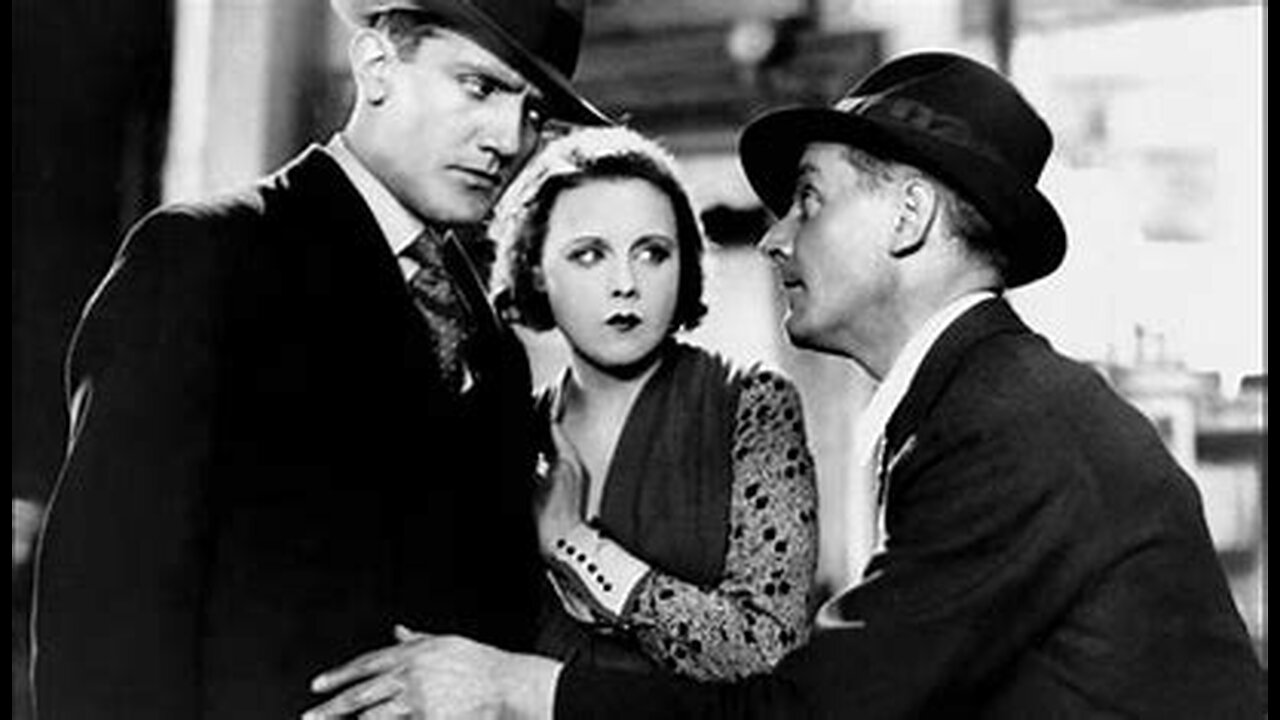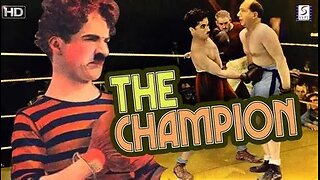Premium Only Content

Blackmail (Silent/Crime/Thriller, 1929)
Blackmail is a crime thriller with elements of drama and suspense, often classified as a pioneering work in the psychological thriller subgenre. It’s notable for being one of the first British "talkies" (sound films), blending silent film techniques with innovative sound design, which adds to its moody, suspenseful tone.
Plot
The story follows Alice White (Anny Ondra), a young woman in London who’s dating Frank Webber (John Longden), a Scotland Yard detective. After a petty argument with Frank, Alice impulsively agrees to meet another man, an artist named Mr. Crewe (Cyril Ritchard), at his studio. Crewe attempts to assault her, and in self-defense, Alice kills him with a bread knife. Panicked, she flees the scene, leaving clues behind.
Frank, assigned to the case, soon realizes Alice’s involvement and tries to protect her by concealing evidence. However, a sleazy petty criminal, Tracy (Donald Calthrop), witnesses Alice leaving the studio and blackmails the couple for money and favors. The tension escalates as Alice grapples with guilt, Frank wrestles with his duty, and Tracy’s scheme unravels. The climax features a dramatic chase through the British Museum, where justice—and Alice’s fate—hangs in the balance. The film ends ambiguously, with Alice’s secret intact but her psychological burden unresolved, a signature Hitchcock touch.
Cast
Anny Ondra as Alice White: A Polish-Czech actress whose expressive face carried over from silent films. Her voice was famously dubbed due to her thick accent (more on that in Fun Facts).
John Longden as Frank Webber: A British actor known for his stoic, everyman roles.
Cyril Ritchard as Mr. Crewe: An Australian actor who brought a sinister charm to the predatory artist.
Donald Calthrop as Tracy: A standout as the slimy blackmailer, adding a layer of menace.
Sara Allgood as Mrs. White: Alice’s mother, providing domestic grounding.
Director
Alfred Hitchcock directed Blackmail, marking it as an early showcase of his mastery of suspense and visual storytelling. At 30 years old, Hitchcock was already cementing his reputation as the "Master of Suspense," and this film is often seen as his first true "Hitchcockian" work, blending crime, moral ambiguity, and psychological depth.
Awards
Blackmail didn’t win formal awards, as the Academy Awards were in their infancy (first ceremony in 1929) and focused on American films. However, its critical acclaim was significant:
It’s celebrated as Britain’s first feature-length talkie (released July 1929 in a silent version, October 1929 with sound).
The National Board of Review in the U.S. praised its innovation, and it’s now recognized as a landmark in film history by institutions like the British Film Institute (BFI).
Fun Facts
Silent-to-Sound Transition: Hitchcock originally shot Blackmail as a silent film, but midway through production, British International Pictures pushed for sound. He reshot key scenes, making it Britain’s first talkie. A silent version was released for theaters without sound equipment, and both versions survive today.
Voice Dubbing Trick: Anny Ondra’s thick accent posed a problem for the sound version. Since live dubbing wasn’t yet a thing, Hitchcock had British actress Joan Barry speak Alice’s lines off-camera while Ondra lip-synced—a clever workaround and one of cinema’s earliest dubbing experiments.
Hitchcock Cameo: True to form, Hitchcock appears briefly as a passenger on a London Underground train, annoyed by a child—an early example of his signature cameos.
British Museum Chase: The climactic chase was filmed using Schüfftan process (mirrors and miniatures) because the museum denied permission for real shooting. It’s a technical marvel for 1929 and foreshadows Hitchcock’s love of iconic locations.
Sound Innovation: Hitchcock used sound creatively—distorting a neighbor’s voice to repeat "knife" as Alice’s guilt mounts, one of the first uses of sound to reflect a character’s psyche.
Real-Life Inspiration: The plot echoes the 1928 case of Edith Thompson, a British woman executed for her lover’s murder, though Blackmail softens the outcome.
Legacy
Blackmail is a milestone in Hitchcock’s career and film history, bridging silent and sound eras while introducing themes he’d revisit—guilt, voyeurism, and the "wrong man" (or woman) trope. It’s not just a curiosity; it’s a gripping thriller that holds up, earning a spot on the BFI’s "Top 100 British Films" list in 1999.
-
 30:50
30:50
Silver Screen Echoes
1 month agoThe Champion - Charlie Chaplin (Silent Comedy, 1915)
471 -
 LIVE
LIVE
MYLUNCHBREAK CHANNEL PAGE
2 hours agoHistory’s Most SHOCKING Claims?
443 watching -
 LIVE
LIVE
Caleb Hammer
3 hours agoThe First LGBT Divorce On Financial Audit
108 watching -
 DVR
DVR
Badlands Media
1 hour agoBadlands Daily: September 3, 2025 (#2)
15.8K1 -
 LIVE
LIVE
Jim Jordan
2 hours agoEurope’s Threat to American Speech and Innovation
480 watching -
 LIVE
LIVE
The State of Freedom
6 hours agoFLF: #16 Delivering the Truth Comes at a Cost w/ Joe Hoft
22 watching -
 31:01
31:01
Rethinking the Dollar
1 hour agoWe're In A NEW Monetary Reality! Xi & Putin Knows How This ENDS | Morning Check-In: Let's Talk...
5.97K -
 LIVE
LIVE
House Committee on Energy and Commerce
2 hours agoExamining Opportunities to Advance American Health Care through the Use of AI Technologies
23 watching -
 1:04:12
1:04:12
Crypto Power Hour
3 hours ago $0.19 earnedSmart Contracts & Fintech 101
4.94K5 -
 45:55
45:55
Randi Hipper
2 hours agoBITCOIN HOLDS CRITICAL LEVEL! NEXT MOVE DETERMINES EVERYTHING
5.38K